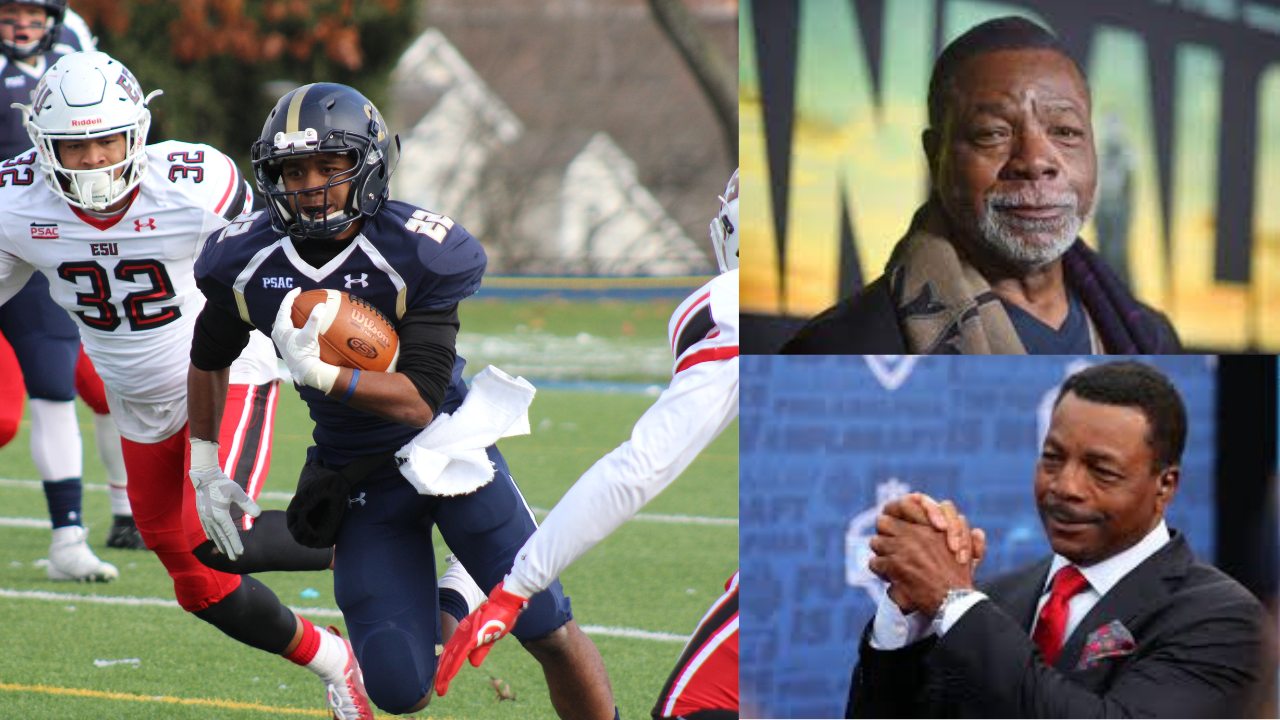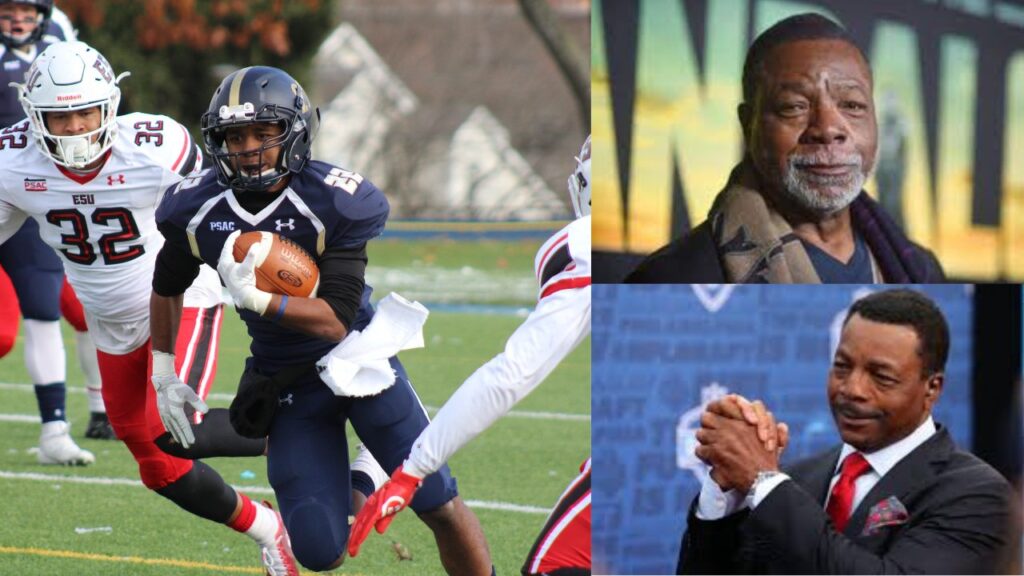
Carl Weathers is best known for his iconic roles in Hollywood, but before he became a star, he had a brief and unremarkable career as a professional football player. In this blog post, we will explore his journey from the gridiron to the silver screen, and how he used his athletic skills and charisma to make a name for himself in the entertainment industry. We will also pay tribute to his legacy, as he passed away earlier this month at the age of 76. Join us as we celebrate the life and career of Carl Weathers, the football player turned actor.
Carl Weathers Career
Carl Weathers was an American actor, director and gridiron football player. He played college football for the San Diego State Aztecs before playing professionally as a linebacker. He joined the Oakland Raiders of the National Football League (NFL) after going undrafted in the 1970 NFL Draft. After two seasons with the Raiders, he played a year with the BC Lions of the Canadian Football League (CFL)
He appeared in eight games in the NFL and 13 games in the CFL, but did not record any significant stats. He retired from football in 1974 and pursued a career in acting. He became famous for his roles as Apollo Creed in the Rocky films, Al Dillon in Predator, Chubbs Peterson in Happy Gilmore, and Greef Karga in The Mandalorian. He died on February 1, 2024, at the age of 76.

Carl Weathers: From Football to Fame
Did you know that Carl Weathers, the actor who played Apollo Creed in the Rocky films, was also a professional football player? In fact, he was so good at football that he was drafted by the Oakland Raiders in 1970 and played in the Canadian Football League for two seasons. But his passion for acting led him to pursue a different career path, one that would make him a household name and a Hollywood legend. In this blog post, we will explore Carl Weathers’ football career, his transition to acting, his net worth, and his legacy.
Carl Weathers’ football career
Carl Weathers was born on January 14, 1948, in New Orleans, Louisiana. He grew up in a poor family and had to work various jobs to support himself. He developed an interest in football at an early age and played as a linebacker for his high school team. He earned a scholarship to play for San Diego State University, where he was a standout player and a team captain. He graduated with a degree in political science in 1970.
He was drafted by the Oakland Raiders in the seventh round of the 1970 NFL Draft. He played for the Raiders for two seasons, but did not see much action on the field. He was mostly used as a backup and a special teams player. He decided to move to the Canadian Football League in 1971 and joined the BC Lions. He played for the Lions for two seasons and had a more prominent role as a starter. He recorded 18 tackles and one interception in his CFL career.
However, he also faced some challenges and difficulties as a football player. He suffered several injuries that hampered his performance and limited his playing time. He also had conflicts with some of his coaches and teammates, who did not appreciate his outspokenness and ambition. He felt that he was not fulfilling his potential as a football player and that he had more to offer as an entertainer. He retired from football in 1974 and decided to pursue a career in acting.
Carl Weathers’ transition to acting
Carl Weathers had always been interested in acting and performing. He had taken some drama classes in college and had appeared in some local theater productions. He also had a natural charisma and a commanding presence that made him stand out. He moved to Los Angeles and enrolled in the Southwestern University School of Law, where he earned a master’s degree in drama. He also started auditioning for various roles in films and television shows.
He got his breakthrough role in 1976, when he was cast as Apollo Creed, the charismatic and flamboyant world heavyweight champion, in the film Rocky. He impressed the director and the star of the film, Sylvester Stallone, with his athletic ability and his acting skills. He reprised his role in three sequels, Rocky II, Rocky III, and Rocky IV, and became one of the most iconic and memorable characters in the Rocky franchise. He also developed a close friendship with Stallone, who later cast him in other films, such as Rambo: First Blood Part II and Creed II.
He also starred in other notable films, such as Predator, where he played a CIA agent and a former teammate of Arnold Schwarzenegger’s character, Happy Gilmore, where he played a golf instructor and a mentor to Adam Sandler’s character, and The Mandalorian, where he played a bounty hunter guild leader and an ally of the main character. He also appeared in several television shows, such as Arrested Development, where he played a fictionalized version of himself, and Chicago Justice, where he played a state attorney. He was praised for his versatility and charisma as an actor, and for his ability to play both serious and comedic roles.
Carl Weathers’ net worth and legacy
Carl Weathers had a successful and lucrative career as an actor and a producer. He also had some endorsements and business ventures, such as a line of fitness products and a restaurant chain. According to some sources, his net worth was estimated to be around $8 million at the time of his death.
He also had a significant impact and influence on the entertainment industry and culture. He was one of the first African-American actors to play a leading role in a major film franchise, and he inspired many other actors and athletes to follow his footsteps. He was also known for his philanthropy and his involvement in various causes, such as education, health, and civil rights. He was honored with several awards and recognitions, such as a star on the Hollywood Walk of Fame, a Golden Globe nomination, and a Lifetime Achievement Award from the Screen Actors Guild.
He passed away on February 4, 2024, at the age of 76, due to complications from a stroke. He was survived by his wife, Jennifer Peterson, and his four children, Jason, Matthew, Nicole, and Damon. He was mourned by his family, friends, fans, and colleagues, who remembered him as a talented and generous person, and a legend in his own right.
Conclusion
Carl Weathers was a remarkable person who had an amazing journey from football to fame. He was a talented and versatile actor who played some of the most memorable roles in film history. He was also a successful and wealthy producer who had a keen eye for business. He was also a generous and influential philanthropist who made a difference in the world. He was a legend who left behind a legacy that will live on forever.
We hope you enjoyed this blog post about Carl Weathers’ football career, his transition to acting, his net worth, and his legacy. If you did, please share it with your friends and family, and leave a comment below. What are your favorite Carl Weathers films or roles? How did he inspire you or impact your life? We would love to hear from you. Thank you for reading.
FAQs
What position did Carl Weathers play in football?
Carl Weathers played as a linebacker, a defensive position that involves tackling the opposing team’s ball carriers and covering the receivers. He was known for his speed, strength, and agility as a linebacker.
How long did Carl Weathers play in the NFL and the CFL?
Carl Weathers played in the National Football League (NFL) for two seasons, from 1970 to 1971, as a member of the Oakland Raiders. He played in the Canadian Football League (CFL) for two seasons, from 1971 to 1972, as a member of the BC Lions.
What were some of Carl Weathers’ achievements and challenges as a football player?
Some of Carl Weathers’ achievements as a football player were:
- He earned a scholarship to play for San Diego State University, where he was a standout player and a team captain.
- He was drafted by the Oakland Raiders in the seventh round of the 1970 NFL Draft.
- He recorded 18 tackles and one interception in his CFL career.
Some of Carl Weathers’ challenges as a football player were:
- He suffered several injuries that hampered his performance and limited his playing time.
- He was mostly used as a backup and a special teams player in the NFL, and did not see much action on the field.
- He had conflicts with some of his coaches and teammates, who did not appreciate his outspokenness and ambition.
Why did Carl Weathers retire from football in 1974?
Carl Weathers retired from football in 1974 because he felt that he was not fulfilling his potential as a football player and that he had more to offer as an entertainer. He also wanted to pursue a career in acting, which was his passion.
How did Carl Weathers pursue a career in acting after retiring from football?
Carl Weathers pursued a career in acting after retiring from football by:
- Moving to Los Angeles and enrolling in the Southwestern University School of Law, where he earned a master’s degree in drama.
- Auditioning for various roles in films and television shows.
- Getting his breakthrough role as Apollo Creed in the Rocky films, which launched his acting career.
What were some of Carl Weathers’ notable roles in films and television shows?
Some of Carl Weathers’ notable roles in films and television shows were:
- Apollo Creed, the charismatic and flamboyant world heavyweight champion, in the Rocky films.
- Dillon, a CIA agent and a former teammate of Arnold Schwarzenegger’s character, in Predator.
- Chubbs Peterson, a golf instructor and a mentor to Adam Sandler’s character, in Happy Gilmore.
- Greef Karga, a bounty hunter guild leader and an ally of the main character, in The Mandalorian.
- Himself, a fictionalized version of himself, in Arrested Development.
- Mark Jefferies, a state attorney, in Chicago Justice.
What was Carl Weathers’ net worth at the time of his death?
Carl Weathers’ net worth at the time of his death was estimated to be around $8 million, according to some sources. His net worth was based on his acting and producing work, as well as his endorsements and business ventures.
What was Carl Weathers’ legacy and impact on the entertainment industry and culture?
Carl Weathers’ legacy and impact on the entertainment industry and culture were:
- He was one of the first African-American actors to play a leading role in a major film franchise, and he inspired many other actors and athletes to follow his footsteps.
- He was praised for his versatility and charisma as an actor, and for his ability to play both serious and comedic roles.
- He was known for his philanthropy and his involvement in various causes, such as education, health, and civil rights.
- He was honored with several awards and recognitions, such as a star on the Hollywood Walk of Fame, a Golden Globe nomination, and a Lifetime Achievement Award from the Screen Actors Guild.
Leave a Reply